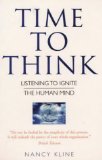ARE YOU A BETTER COACH THAN A LAMP POST? 1
In today’s guest post Laura Li shares some of her personal experience and what she’s learnt as she has grown as a coach.
ARE YOU A BETTER COACH THAN A LAMP POST?
By Laura Li

At the time of writing I’m waiting to film an episode of the TV quiz show Pointless.
The audition includes a short mock version of the game. The test at the audition is not so much about getting the right answer, but how you interact with the other contestants and the quiz show hosts.
But I was so nervous. I just wanted to impress the producers. I forgot about the other people there. I was so intent on getting not just the right answers, but good answers, perfect answers, even. I didn’t really interact with anybody at all.
I wasn’t paying much attention to anyone else and was more focussed on myself and what I was going to say next.
And this is a trap we can fall into when we lack confidence in our coaching ability.
When I was coaching my very first clients, I would ask what they wanted to talk about in the session. And from the moment they started talking I was thinking about my next question.
What I was going to say next.
The Voice in my head started up, telling me there was a perfect question that would help the client.
And I wasn’t good enough to think of it.
Every other coach knew exactly what to ask. But not me. I was stumbling and fumbling around in the dark and soon someone was going to notice. The Voice told me I didn’t deserve to call myself a coach.
It was all about how clever my questions were. Not about giving the client the space to think things through for themselves. I’m embarrassed to admit it, but I was still at the stage of thinking that coaching was all about me.
The Voice still whispers to me that I’m not good enough. But I’m glad to say I’ve built upon my initial training and I’ve learned that it’s not all about me. However, I’m still new at this and I do still worry sometimes about how I’ll manage a coaching session.
If, like me, you still worry sometimes about what you’ll say to your client or what questions you’ll ask:
Remember to ASK.
A is for attention.
Nancy Kline, author of Time To Think, tells us that “the quality of our attention determines the quality of other people’s thinking”. For us coaches that means we need to be focussed on the client.
Not on us and certainly not on what our next question should be.
Of course the quality of your questions matter. As coaches, questions are our stock in trade. But we need to let go of the need to look good.
And you know what? The irony is that when you focus on the client completely, and give over your attention to them, the right question will come. I say the “right” question. The beauty is there is no actual right or wrong.
It’s not like brain surgery. Then there’s a proper way to perform the procedure. Or a fatal way.
I love the rich diversity that is coaching. There are so many different ways of getting to awareness and action.
This is not to say that we don’t want to be good at what we do. Of course we want to take our clients deep and be excellent coaches.
I simply mean that for newer coaches, if you lack confidence around finding the right questions at the right time, moving the focus from you to your client will put the attention where it belongs – on them. And it will also give you the space you need – to tap into your coaching wisdom and intuition.
Even if the “correct” question doesn’t come, the right one will.
Michael Neil says that if a man tells his hopes, dreams, and problems to a lamp post each week, the simple act of unburdening himself and leaving his mind free and clear will lead to more inspired ideas and a better life.
So even without the perfect question you are still serving your clients just by spending time and attention on them.
S is for silence.
You need to be comfortable with silence.
Or if you can’t mange that, you need to be comfortable with being uncomfortable with silence.
One thing that used to make me really worry and lack confidence during a coaching session was long silences. As a client I love them. So much going on in my head, so much thinking, so much problem- solving, so much new awareness.
But as a coach I thought the silence meant nothing was happening. My client was waiting. Not only was she waiting, she was also wondering what the heck’s wrong with my coach? Is she even still there on the end of the phone? I rushed to ask the next question.
Silence is your best friend.
I can’t tell you exactly how long to leave the silence. I think Rich Litivin, author of The Prosperous Coach, suggests waiting until the client speaks again. But as with everything Rich Litvin teaches us, that is entirely dependant on each unique situation.
What I can say, is that if you’re very new to coaching, you should probably be leaving the silence for longer than you do.
Silence is actually another way of giving the client your attention. Who ever stays silent in normal conversation with them? When do they ever get the time and space to work out what they think?
Don’t be afraid of the silence. It’s usually where the magic is happening.
My coaching school taught me the GROW model and we had 45 minutes to get from Goal to Will. There wasn’t much time for silence in there. As a trainee coach I felt like I was galloping through the process so I could pat myself on the back for using the system correctly and a job well done.
I must have done a good job, right? Because we got all the way to Will and we even had 5 minutes to spare. How come my clients weren’t making much progress?
If you lack a little confidence in your coaching it’s easy to see the silence as robbing you of precious time to move the session along or “do” the coaching. You can see it as failure on your part to provide value to the client. After all, they’re not paying you to just sit there and say and do nothing, are they?
But they’re not paying you for the coaching session at all. The session is simply the vehicle by which your coaching takes place. And in that session you can use space, attention, questions and silence.
The old cliché is true, the whole is greater than the sum of the parts. They are paying you for whatever result it is they came to you for. Lose weight, change job, get married.
And silence will get you to that result much quicker than talking too much.
The lamp post doesn’t talk back. It’s all silence from the lamp post. And while that’s going too far the other way, your client needs the silence to reach clarity.
Silence is a necessary a part of the whole.
K is for keeping the space.
Keeping (or holding) the space for a client means letting them know that the coaching session is a time for them to be with themselves. It’s a luxury they won’t often get in today’s fast paced world.
It’s a time for them to think about themselves and their life. To indulge in an hour when they can think, often for the first time, about what they really want. And what’s holding them back. When new awareness can happen in an instant.
The lamp post exists for the “client” in a space where he is in between work and home. Where he has for a short while left behind the pressures of work and before he has crossed the threshold back into the bustle of home life.
Create that same space for your clients.
It can take courage to create that space for someone else. It’s an honour and a privilege to be witness to someone else’s innermost thoughts. It can be scary to lead your client into that space.
But rather than pulling back, believe that your clients want you to lead them into this space.
And they need you to.
This is not a linear 1-2-3 step process.
These are principles that have guided me (and still do) when I find that I’m getting too much into my own head and worrying about not being a good enough coach. It’s part of a way of being to help me be the best coach I can be in any given moment.
Remembering to ASK has helped me to improve as coach. Both in terms of technical skill and my confidence. I hope there is something in here that is useful for you too.
We can be sure you’re a better coach than a lamp post.
So be with the client, ASK, and trust your own intuition.
And theirs.
About Laura Li
Laura Li is a Certified Life Coach who works with people who fear they’re not good enough and helps them change their thinking to change their life.
To find out more about Laura or her work you can contact her at laura.li@btinternetcom
